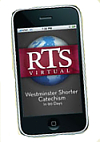With a growing number of Americans relying on smartphones and other hand-held gizmos to access the Internet, a few seminaries are designing apps to put their campuses front and center on the small screen. Their administrators still see the traditional website as the cornerstone of a school's digital profile but recognize that other components - YouTube videos, social media accounts, and mobile apps — can add to the effectiveness of a communication portfolio.
The rapid rise of apps is tied to the soaring popularity of mobile devices, particularly the iPhone and Android smartphones. A third of American adults now own a smartphone, and a quarter of those owners use their phones as their primary means of accessing the Internet. While an app is not an alternative to a school's homepage, it can provide specialized information to a tightly targeted audience.
Reformed Theological Seminary, Covenant Theological Seminary, and Asbury Theological Seminary are examples of schools that have successfully designed apps to serve specific purposes. An examination of each reveals how visionary a campus can be when creating something unique for its public.
Reformed Theological Seminary
Westminster Shorter Catechism in 90 Days
Reformed Theological Seminary (RTS) has seven physical campuses (Atlanta, Georgia; Charlotte, North Carolina; Houston, Texas; Jackson, Mississippi; Memphis, Tennessee; Orlando, Florida; and Washington, D.C.) and a virtual campus that serves as the school's distance-learning arm. The virtual campus, overseen by its own president, Andy Peterson, offers a range of programs through a variety of digital media. As examples:
■ Students can earn a master of arts in religion via the Virtual Online Classroom, which uses an open-source course management system called Moodle.
■ Listeners can sit in on 30 courses, chapel messages, and seminars through iTunes U.
■ Viewers can access classroom lectures, complete with embedded PowerPoint slides, thanks to the seminary's YouTube channel.
■ The latest addition to the mix is an iPhone app that is simple in design and pointed in purpose.
Peterson and his staff decided to use smartphone technology to offer something educational that reflects the school's mission. They decided to design an app to help users memorize the text of the Westminster Shorter Catechism in 90 days. The school contracted the services of an app design firm called Allogy Interactive to build the tool and make minor updates. Peterson doesn't see the finished product as a marketing instrument. Aside from an email address and a link to the seminary's newsletter, there is no promotion on the app. It's simply a way for the school to show its commitment to its core tradition.
Covenant Theological Seminary
Worldwide Classroom
Covenant Theological Seminary in St. Louis, Missouri, reaches out with several websites. One, www.worldwide-classroom.com offers users 20 free audio classes, class syllabi, and some video resources. Another, www.livingchristtoday.com, features daily devotionals and podcasts (or webcasts) of the school's daily radio program, Living Christ Today, by the seminary's president, Bryan Chapell. The seminary's app, Worldwide Classroom, pulls content from both sites, which gives users a consistent library of academic tools and daily resources for spiritual development.
Matt Seilback, director of communications at Covenant, says the app was designed to promote the school's mission to "equip pastors and those who serve beside them." While the app may be of use to some students, the idea of using it as a recruiting tool was never a priority. The app offers the general public another way to access resources the school already offers — in a convenient format.
Developing engaging media content is part of the seminary's strategic plan, as determined by the board. A media grant allowed the school to hire Subsplash, a software development firm specializing in mobile devices, to create the app. The company is on call for general maintenance, but the content feeds directly from sites maintained by Seilback's staff. Looking ahead, Seilback says, "We're developing more short-form content — video content and daily sermons."
Asbury Theological Seminary
AsburyMobile
J.D. Walt is vice president for community life and dean of chapel at Asbury Theological Seminary in Wilmore, Kentucky. Conversations between Walt and the school's president, Timothy Tennent, led to a conclusion that the seminary needed an app to share what was happening on campus. Although outside companies typically develop apps, Asbury has a programmer on staff with the ability to build the app in-house. The programmer, Kaleb Heitzman, is now director of communications at Asbury and oversees the app's maintenance.
AsburyMobile's content is relatively flat. "There's not a lot of return traffic," Walt admits. The app is full of useful information - campus maps, course lists, school directory, a link to the Asbury Twitter page — but it lacks the kind of content that sparks frequent visits. In many ways, it's a mirror of the school's website. To create a more dynamic experience for users, the school is developing an app called Seedbed, which will give people free access to some Asbury resources.
Essential questions
When a seminary decides to create an app, it faces what some writers call "the terror of the blank page." Unlike a website, no standard format exists. Answering five questions will help jumpstart the process.
■ Who is our target audience?
■ What information do we want to provide this audience?
■ Who will build and manage the app?
■ How will we fund the project?
■ How will we market the app once it is finished?
Whether a school should invest its resources in developing and marketing an app will depend on the public it is trying to reach. If members of the target audience prefer to browse the Web with Internet Explorer, an app is an unnecessary frill. But if they're on their phones looking for information, it's a valuable tool.